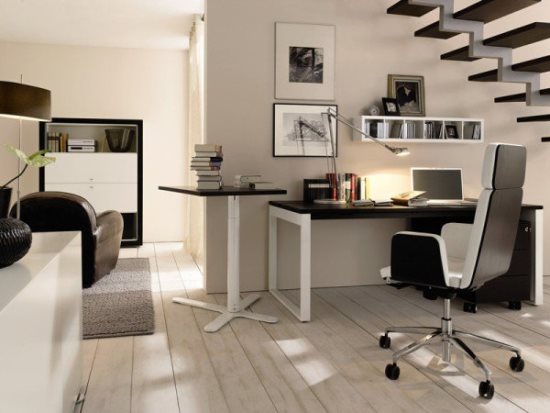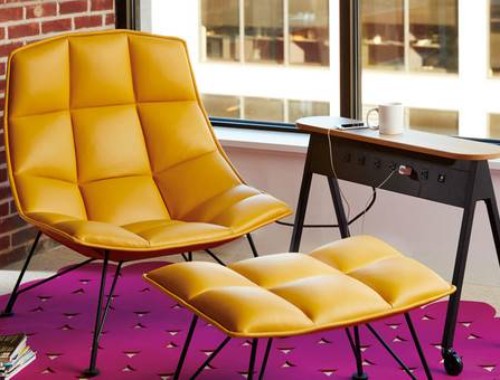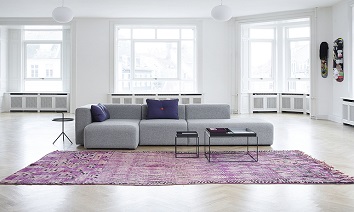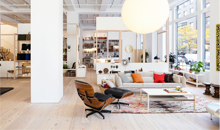Cautious optimism pervades office furniture manufacturers
Source:mibiz.com
Apart from uncertainty caused by global turmoil and the current political landscape, the office furniture industry seems primed for at least two more years of positive, albeit modest, growth.

Apart from uncertainty caused by global turmoil and the current political landscape, the office furniture industry seems primed for at least two more years of positive, albeit modest, growth.
Multiple office furniture industry executives shared that sense of cautious optimism in interviews with MiBiz during this year’s NeoCon trade show in Chicago. While many of them said they believe the North America will continue to lead amid uncertainty in global markets, their individual companies have also started to focus on niche markets, whether K-12 education or health care.
“We still see strong activity levels in a number of areas,” said Brian Walker, president and CEO of Zeeland-based Herman Miller Inc. “Overall, I think the North American contract market is pretty good. I think we have a good formula in terms of new products (and) between the combination of the market and us, we feel pretty good about what we see.”
Walker’s outlook for Herman Miller, which introduced 15 new products at NeoCon this year, echoes the sentiment across the office furniture industry.
“I think there is general optimism,” said Tom Reardon, executive director of the Grand Rapids-based Business and Institutional Furniture Manufacturers Association (BIFMA). “Everyone I talked to said their business is still strong with incoming orders and things like that. If there is any question mark at all, there’s some analyst calls that some of the public companies have had regarding growth rates slowing down in the near term.”
In its latest forecast, BIFMA expects office furniture production to reach $10.3 billion in 2016, essentially flat from the $10.25 billion produced last year. The organization expects production in 2017 to fare slightly better, increasing 5 percent to $10.8 billion.
Reardon said BIFMA plans to release an updated forecast — including new market data for individual product segments such as health care and education — shortly after this report goes to press.
Jim Keane, president and CEO of Grand Rapids-based Steelcase Inc. sees BIFMA’s relatively flat projections reflecting a lack of strong growth drivers in the North American economy.
“I think flat is an awkward place for business people,” Keane told MiBiz. “Basically, I think we’re in this place where there aren’t a lot of economic drivers out there, and there’s political uncertainty … but there are also some good signs.”
Primarily, Keane cites increasing commodity prices as a stabilizing force for the overall economy.
INTERNATIONAL UNCERTAINTY
However, questions about the state of the global economy have allowed some pessimism to creep into the minds of industry leaders.
“All the noise around Europe and what’s going on in the European Union is what I’ve spent a lot of time thinking about,” Walker said. “Certainly, you can’t help being in business today and not worry about all the social unrest. That stuff makes you nervous because it upsets people’s confidence generally. I don’t have a lot of things that keep me awake at night that are Herman Miller-specific. It’s more trying to think through the things that are going to come from left field that we don’t know about.”
While North America has proven to be a strong market over the last year for office furniture manufacturers, companies have struggled internationally primarily because of negative currency impacts.
The value of the U.S. dollar and concerns over the European Union and other key markets have proved to be headwinds for the office furniture industry, according to executives MiBiz spoke with during NeoCon.
“Other than currency fluctuations, demand is OK,” Keane said. “There’s no market where I’d say it’s incredible and there’s no market that’s awful. We’ve been doing a lot of work in Europe to restructure our footprint, to invest in our brand and products.”
To compensate for fluctuations in the international market, both Herman Miller and Steelcase have started to spread their product portfolios across their global footprints instead of developing specific products for certain markets.
“It’s a big difference for Steelcase,” Keane said. “We used to have products that were North America products for North American markets and French products for France and German products for Germany. Once we have a product line that’s global, you can have stronger demand economically in one region and weaker in another, but no worries because you’ve leveraged that product line across the whole world.”
CAPITALIZING ON NICHE MARKETS
Growth in niche markets such as education and health care is also driving office furniture manufacturers’ positive outlook on the industry.
While Spring Lake-based Izzy+ has experienced growth through all of its product categories, the furniture manufacturer noted particularly positive momentum in K-12 classrooms, said President and CEO Kevin Kuske.
“We’re going into the middle part of the year dramatically up over the first part of the year — and it’s in all places,” Kuske said. “We’re seeing a lot of education (business). The things that drove growth in higher education are now happening in K-12 and that’s a big focus for us here at the show.”
In the past, Izzy+ — a division of Grand Haven-based JSJ Corp. — primarily worked in higher education, but the company has been “pulled into K-12” over the last 18 months as grade schools and high schools realize the benefits of keeping students engaged through various workspaces, Kuske said.
“If I squint my eyes and look at the progression, kindergarten, middle school, college or corporation, they look all alike now,” he said. “There are different sizes and different color pallets, but honestly the kinds of spaces are becoming very similar, which is good. You want those kids coming through school to be prepared for what the work environment is.”
So far, Izzy+ has generated 50 percent more orders in its second quarter compared to the first quarter, and the company expects that momentum to carry over into the third quarter, said Kuske, who declined to disclose annual sales for the manufacturer.
Meanwhile, Steelcase has also benefited from niche markets in both education and health care.
“What we like about health care and education, both customer segments are moving more from a process mentality to an outcome mentality,” Keane said.
In the company’s quarterly call with analysts for the fourth quarter of Steelcase’s 2016 fiscal year, Keane said “across vertical markets in the Americas, we experienced strong order growth in health care and education sectors.”
Keane declined to discuss the current performance of Steelcase’s education division given the company was so close to reporting its quarterly earnings. The company released its first quarter earnings for its 2016 fiscal year.
(Source: mibiz.com Author: John Wiegand)





 沪公网安备31010402003309号
沪公网安备31010402003309号



